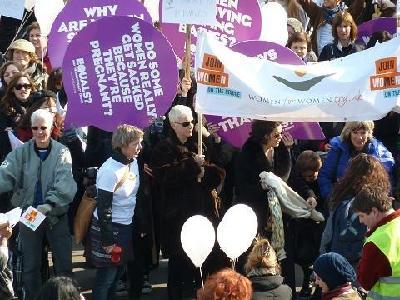
Women are joining together all over the world to mark the 100th anniversary of International Women's Day on March 8.
Women poured through London's streets on Tuesday singing loudly for women's rights.
The banners they carried trained a spotlight on the range of issues still at hand: health, education, and politics to name a few.
Among the demonstrators in London was the musician and activist Annie Lennox. She said the fight for women's rights isn't over.
"There is still so much work to be done with regards to parity for women, equality for women's rights all around the world - not only in the developed countries," Lennox said. "We're here in the UK [United Kingdom] and there's actually four other marches going across different bridges across the entire world."
The march on London's Millenium Bridge Tuesday signified the Bridge of Peace that organizers say they want to build through conflict zones all over the world.
Women gathered in the conflict-ridden eastern region of the Democratic Republic of Congo; they gathered in Afghanistan; and they gathered in Iraq.
In London, a number of leading female politicians and activists joined the demonstration. One of them was Dr Habiba Sarabi. In 2005 she was made Afghanistan's first and only female governor. She says she wanted to empower women in her country and show the international community that Afghanistan is moving forward.
"Working as a female governor is not an easy job. It was for the first time in Afghanistan," Sarabi said. "But I did it because I wanted to prove that women can do in a society like Afghanistan something that men can do."
She says her role as governor of Banyam province shows that Afghanistan has come a long way since the Taliban was ousted a decade ago. But she says it hasn't been easy.
"There were so many people who were against me, they wanted to start some activity and also propaganda against me and they started to make demonstrations," Sarabi said. "But anyway I didn't go backward."
Another Afghan activist in London for Women's Day was Asila Wardak Jamal, who co-founded the Afghan Women's Network.
She says empowering women in Afghanistan is hard when many people are still struggling for basic needs like food.
"There are lots of problems still. Security is a big concern and a big obstacle for [the] women's movement and for women's development," Jamal said. "And also violence against women it's a big concern for Afghan women. The violence against women at the familial level and at the societal level, it's increasing. But still there's a way to go."
That's why these women in London said they, and others around the world, turned out for International Women's Day - to keep women's needs at the forefront of the global agenda. Human rights activist and actress Bianca Jagger was at the London rally. She says women can do it together.
"We need to make a difference and that difference can be made by us as mothers," Jagger said. "And we can make a difference for women throughout the world."
Women's Day was first celebrated in Germany in 1911 and is now marked by over 100 countries around the world.
propaganda: ideas or statements that may be false or exaggerated and that are used in order to gain support for a political leader, party, etc. 宣传;鼓吹
(来源:VOA 编辑:崔旭燕)
